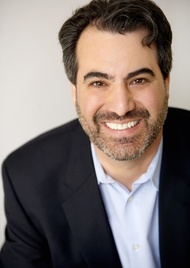By: Ron Pernick

For all the recent discussion about climate and carbon, I think we're missing a critical point. Climate is only one part of the larger global economic, energy, and environmental picture. To accurately depict the challenges and opportunities that we face, both politically and economically, we shouldn't be focused solely on climate. Don't get me wrong. I see climate change as a crucial driver and one of the most important issues of our time. But we'll never win the clean-tech race if we lead with climate or see it in isolation. Indeed, against the backdrop of Copenhagen, and the failure to reach any real, meaningful, and binding commitments, I believe we need to quickly shift focus and strategy. We should be framing the clean-tech revolution not in the context of something as amorphous as climate change and as divisive as cap-and-trade, but instead on job creation, economic competitiveness, energy independence, and national security. We should be focused on the race to provide the tools and know-how to solve the biggest issues and meet the greatest challenges of our time: resource scarcity and constraints; the impact of volatile, highly polluting fossil fuels; and the explosive growth of the world's middle classes (who, like most people in the developed world, want easy and convenient access to transportation, communication networks, and electricity, heating, and cooling, among other things). This brings me to the title of this column. In 2004, linguist, professor, and political strategist George Lakoff wrote a book entitled: Don't Think of an Elephant! It's an insightful and critical primer on the importance of framing and language in selling political ideas. In the book he outlines how the Republican right learned how to use language to frame the debate. They named the estate tax the "death tax," (a brilliant if disingenuous framing) and proffered concepts like "pro life," "tax relief," and "family values." By using such terms, even if not wholly accurate, they took the upper hand by casting their ideas in the best possible light. Who's opposed to life, relief, and values? In his book, professor Lakoff points out another interesting linguistic and messaging trick: By telling readers or an audience not to think about something (whatever you do, do not think of an elephant), it sets up a dynamic where that's exactly what they think about. If politicians, business leaders, and others are to lead the U.S. to a clean-tech victory, they need to focus on what matters most to the American people and recast the energy movement in a new light -- in language that is both memorable and relevant. They need to focus on American innovation, creativity, and resourcefulness; on job creation, economic competitiveness, and security; and on shared values. Indeed, poll after poll shows that Americans unequivocally support clean energy. It is one of the least divisive and partisan issues out there - with support from both sides of the aisle. Recent polls by Gallup, the Center for American Progress, Pew, and others find that a majority of Americans, between 70-80 percent, support the move away from oil, gas, and coal to renewable energy sources such as wind and solar. We had our own lesson in framing when starting our research and publishing firm. In 2000, when founding Clean Edge, the most used terms for the sector were "environmental technologies" and "alternative energy." But these were clearly inadequate terms - and ones that many on both the left and right frequently associated with Birkenstock-wearing, back-to-the-earth, environmentalists. The challenge: To rename and define an emerging sector that was, even in 2000, a multi-billion dollar industry, and one that we believed was poised to be a major engine of economic growth for the next two to three decades. In looking for the right frame, Clean Edge co-founder Joel Makower and I decided to focus on the concept of "clean tech." Back in 2000, the term was still relatively unheard of (a Google search at the time came back with only a couple dozen relevant returns). Now, clean tech is a widely used term by politicians, businesspeople, and the media. A Google search today results in more than 50 million returns. Like I said earlier, who can argue with terms like "clean" and "technology?" Moving forward, if the U.S. is to lead the world in the clean-tech transition, it will need to use language, frames, and concepts that best support the movement. As noted above, we need to collectively paint visions and pathways that are inspirational and affirming. Instead of leading with carbon offsets, cap-and-trade, and climate mitigation, we should be focusing on energy independence and security; clean-technology innovation; green-job creation; and global resource management and leadership. I'm thinking of things like large-scale solar farms, 21st century electric grids, advanced water filtration systems, real-time global environmental databases, and all-electric vehicle networks. What are you thinking of? ---------Ron Pernick is cofounder and managing director of Clean Edge, Inc. and coauthor of The Clean Tech Revolution.

